Abstract
Portasystemic encephalopathy has been a major deterent to the utilization of total or non-selective shunts. A procedure to determine the maximum rate of urea synthesis (MRUS) has been developed and a depression in the ability to synthesize urea has been shown to correlate closely with the development of encephalopathy. Utilizing this procedure and a modified ammonium tolerance curve, a controlled comparison was instituted between selective and non-selective shunts. Following a non-selective or total shunt, there was a definite deterioration in both the MRUS and the ammonium chloride tolerance curve which was accompanied by a high rate of clinical encephalopathy. In marked contrast, the selective shunt, which maintains portal venous perfusion of the liver, showed little or no change in the MRUS and the ammonium chloride tolerance curve following the selective shunt and there was a very low incidence of encephalopathy. The difference between the non-selective and selective shunt in maintenance of urea synthesis, metabolism of ammonium chloride, and the development of clinical encephalopathy show the selective shunt procedure to be definitively superior in this regard.
Full text
PDF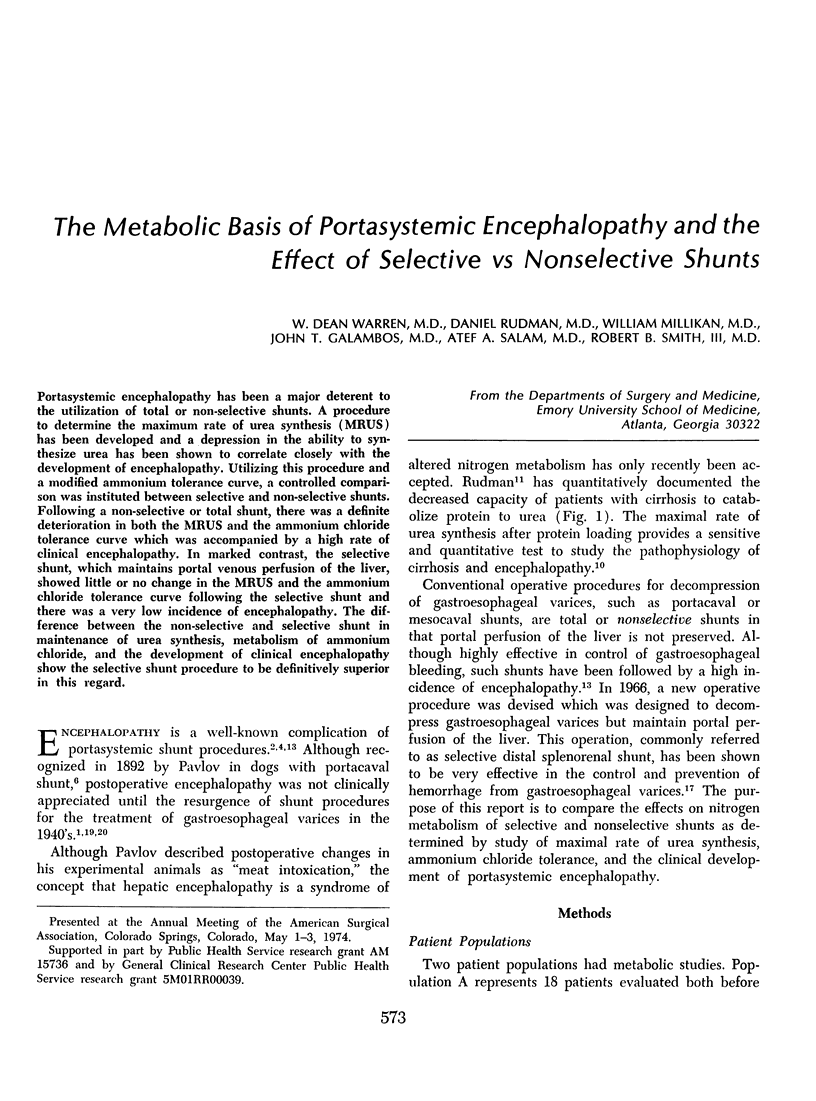
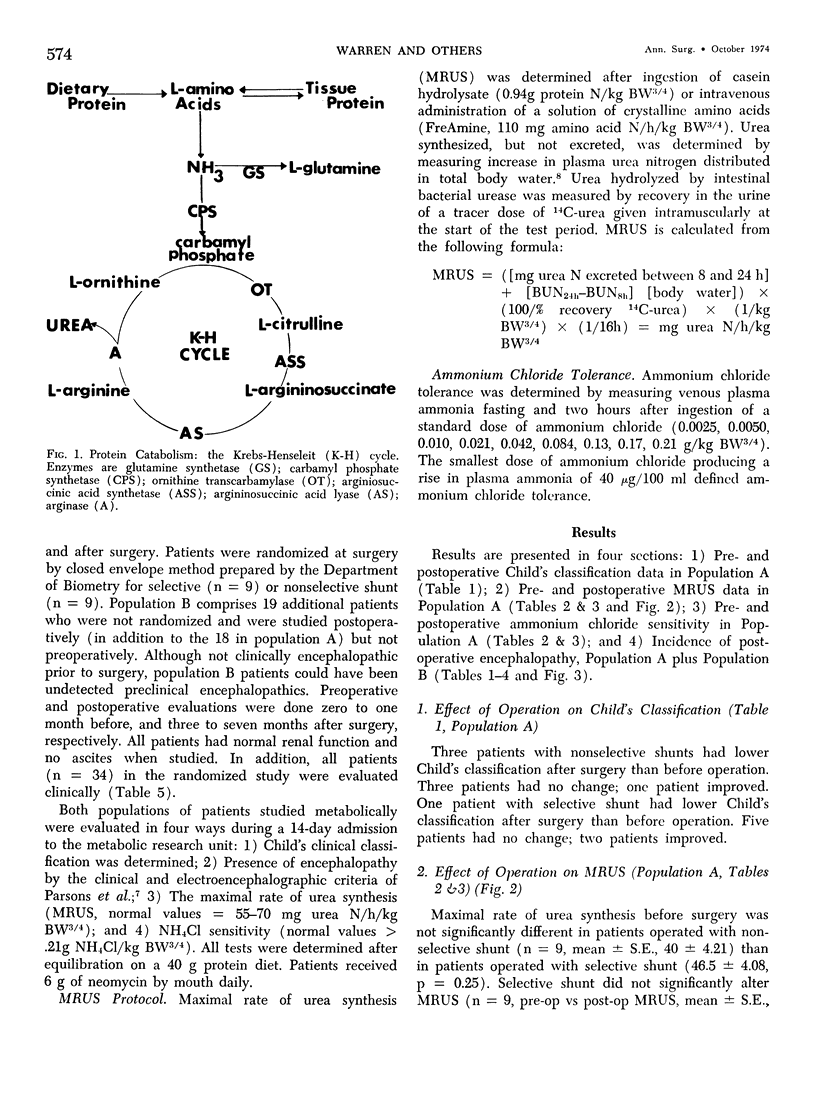

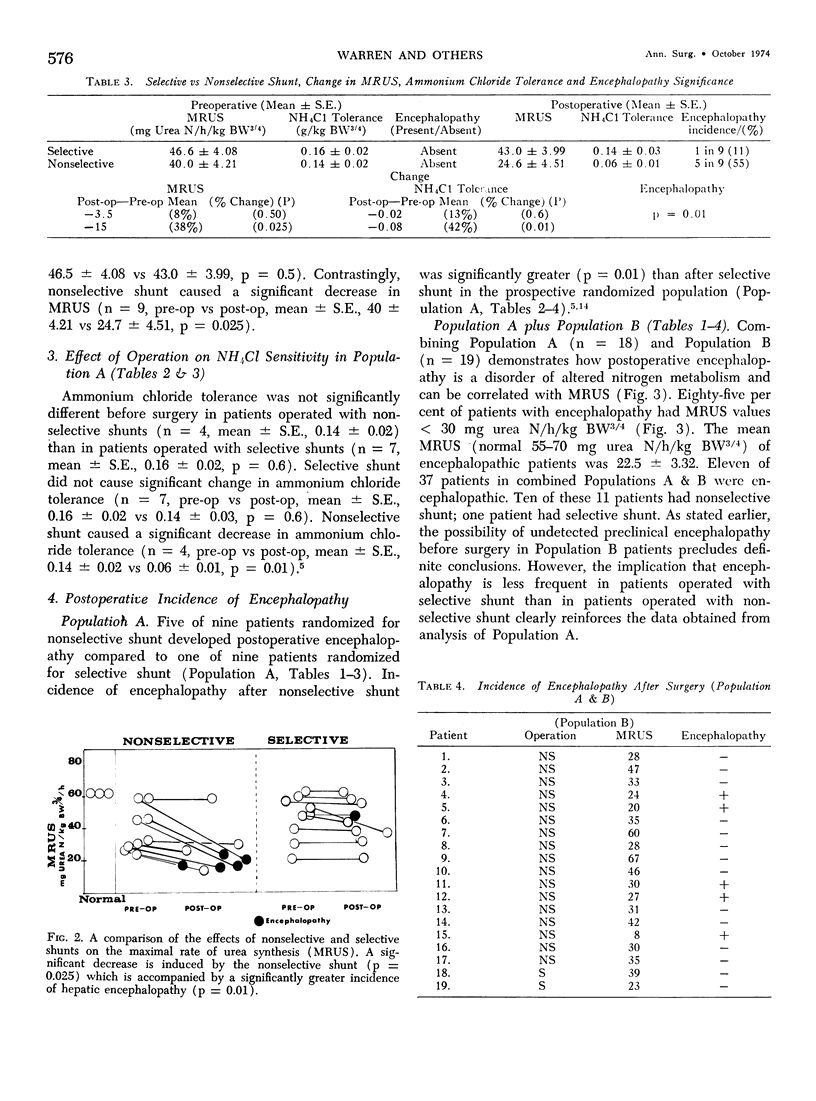
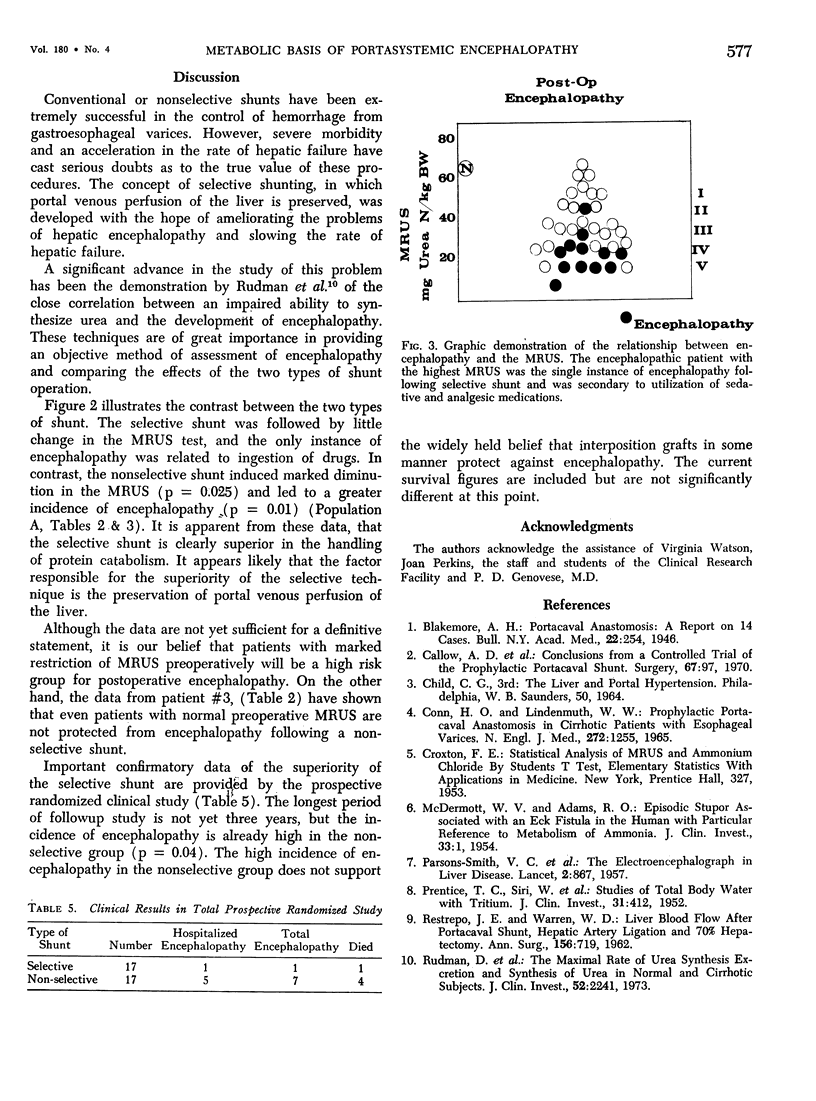
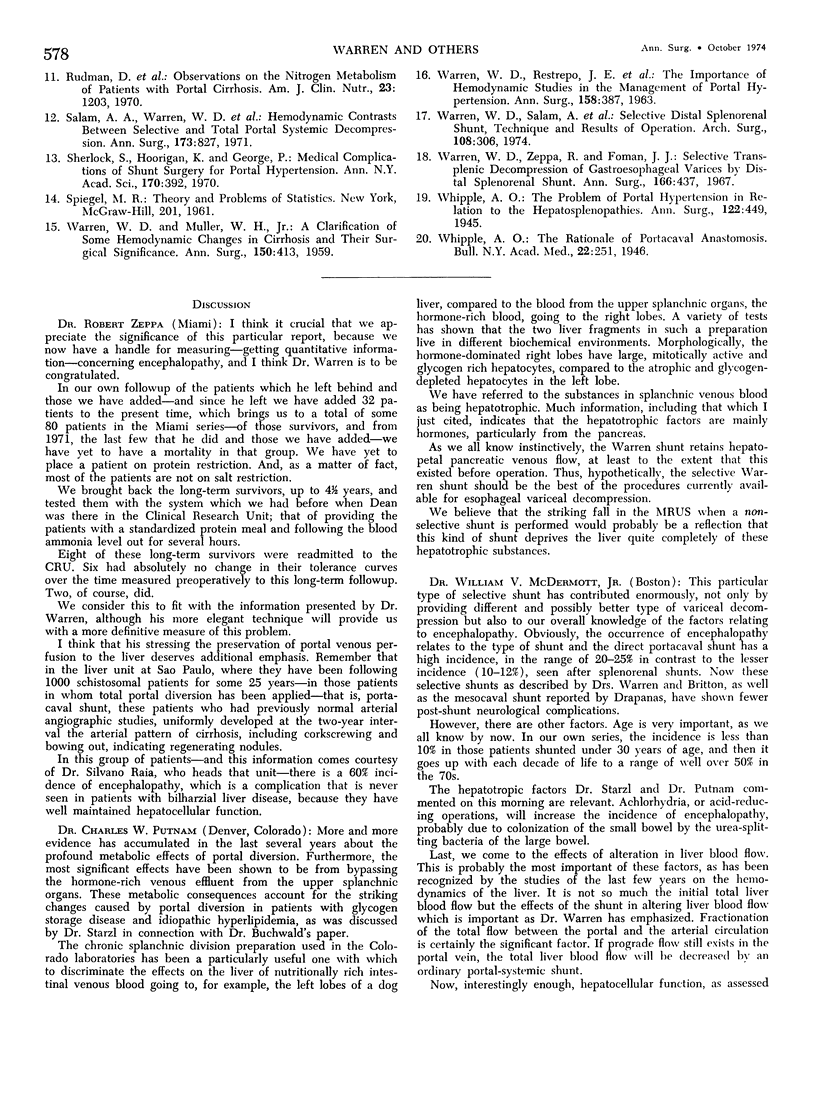
Selected References
These references are in PubMed. This may not be the complete list of references from this article.
- Blakemore A. H. Portacaval Anastomosis: A report on Fourteen Cases. Bull N Y Acad Med. 1946 May;22(5):254–263. [PMC free article] [PubMed] [Google Scholar]
- CONN H. O., LINDENMUTH W. W. PROPHYLACTIC PORTACAVAL ANASTOMOSIS IN CIRRHOTIC PATIENTS WITH ESOPHAGEAL VARICES: A PROGRESS REPORT OF A CONTINUING STUDY. N Engl J Med. 1965 Jun 17;272:1255–1263. doi: 10.1056/NEJM196506172722402. [DOI] [PubMed] [Google Scholar]
- Callow A. D., Resnick R. H., Chalmers T. C., Ishihara A. M., Garceau A. J., O'Hara E. T. Conclusions from a controlled trial of the prophylactic portacaval shunt. Surgery. 1970 Jan;67(1):97–103. [PubMed] [Google Scholar]
- McDERMOTT W. V., Jr, ADAMS R. D. Episodic stupor associated with an Eck fistula in the human with particular reference to the metabolism of ammonia. J Clin Invest. 1954 Jan;33(1):1–9. doi: 10.1172/JCI102862. [DOI] [PMC free article] [PubMed] [Google Scholar]
- PARSONS-SMITH B. G., SUMMERSKILL W. H., DAWSON A. M., SHERLOCK S. The electroencephalograph in liver disease. Lancet. 1957 Nov 2;273(7001):867–871. doi: 10.1016/s0140-6736(57)90005-3. [DOI] [PubMed] [Google Scholar]
- PRENTICE T. C., SIRI W., BERLIN N. I., HYDE G. M., PARSONS R. J., JOINER E. E., LAWRENCE J. H. Studies of total body water with tritium. J Clin Invest. 1952 Apr;31(4):412–418. doi: 10.1172/JCI102624. [DOI] [PMC free article] [PubMed] [Google Scholar]
- RESTREPO J. E., WARREN W. D. Total liver blood flow after portacaval shunts, hepatic artery ligation and 70 per cent hepatectomy. Ann Surg. 1962 Nov;156:719–726. doi: 10.1097/00000658-196211000-00003. [DOI] [PMC free article] [PubMed] [Google Scholar]
- Rudman D., Akgun S., Galambos J. T., McKinney A. S., Cullen A. B., Gerron G. G., Howard C. H. Observations on the nitrogen metabolism of patients with portal cirrhosis. Am J Clin Nutr. 1970 Sep;23(9):1203–1211. doi: 10.1093/ajcn/23.9.1203. [DOI] [PubMed] [Google Scholar]
- Rudman D., DiFulco T. J., Galambos J. T., Smith R. B., 3rd, Salam A. A., Warren W. D. Maximal rates of excretion and synthesis of urea in normal and cirrhotic subjects. J Clin Invest. 1973 Sep;52(9):2241–2249. doi: 10.1172/JCI107410. [DOI] [PMC free article] [PubMed] [Google Scholar]
- Salam A. A., Warren W. D., LePage J. R., Viamonte M. R., Hutson D., Zeppa R. Hemodynamic contrasts between selective and total portal-systemic decompression. Ann Surg. 1971 May;173(5):827–844. doi: 10.1097/00000658-197105000-00022. [DOI] [PMC free article] [PubMed] [Google Scholar]
- WARREN W. D., MULLER W. H., Jr A clarification of some hemodynamic changes in cirrhosis and their surgical significance. Ann Surg. 1959 Sep;150:413–427. doi: 10.1097/00000658-195909000-00007. [DOI] [PMC free article] [PubMed] [Google Scholar]
- WARREN W. D., RESTREPO J. E., RESPESS J. C., MULLER W. H. THE IMPORTANCE OF HEMODYNAMIC STUDIES IN MANAGEMENT OF PORTAL HYPERTENSION. Ann Surg. 1963 Sep;158:387–404. doi: 10.1097/00000658-196309000-00008. [DOI] [PMC free article] [PubMed] [Google Scholar]
- Warren W. D., Salam A. A., Hutson D., Zeppa R. Selective distal splenorenal shunt. Technique and results of operation. Arch Surg. 1974 Mar;108(3):306–314. doi: 10.1001/archsurg.1974.01350270040008. [DOI] [PubMed] [Google Scholar]
- Warren W. D., Zeppa R., Fomon J. J. Selective trans-splenic decompression of gastroesophageal varices by distal splenorenal shunt. Ann Surg. 1967 Sep;166(3):437–455. doi: 10.1097/00000658-196709000-00011. [DOI] [PMC free article] [PubMed] [Google Scholar]
- Whipple A. O. The Rationale of Portacaval Anastomosis. Bull N Y Acad Med. 1946 May;22(5):251–253. [PMC free article] [PubMed] [Google Scholar]


